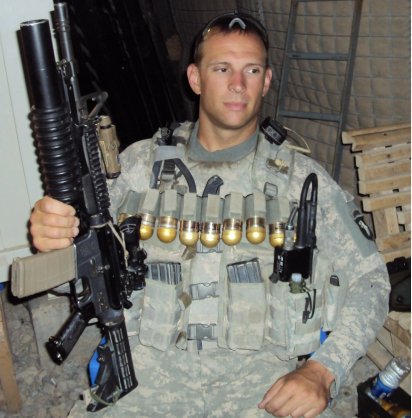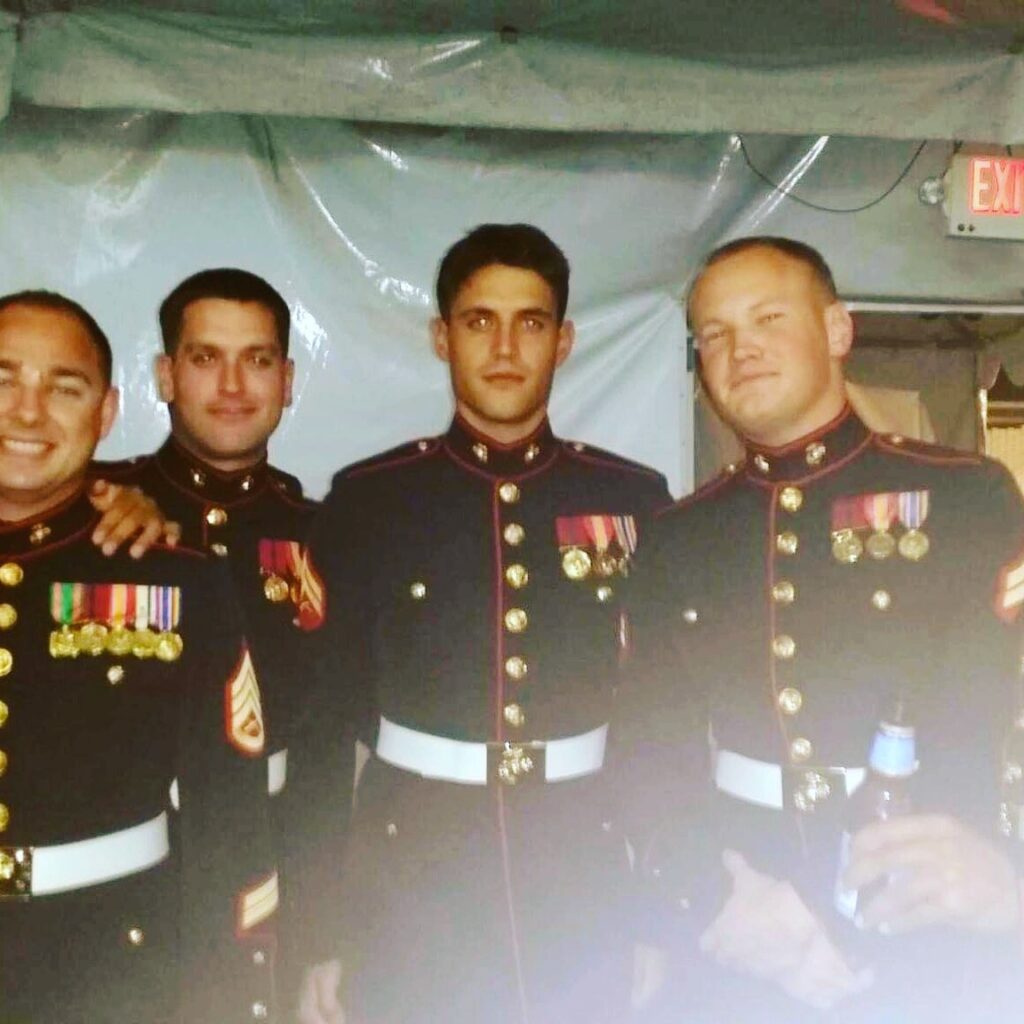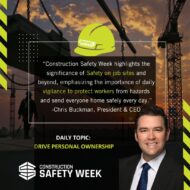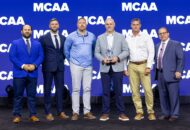Veterans Day is a federal holiday that honors those who have served in the United States Armed Forces. BMWC believes that veterans are dependable individuals who deserve an opportunity to find a job once their service has ended. Veterans offer a wide range of skills that can be transferrable in many areas. We recognize military members for their adaptability, bravery, and leadership. Our service members offer unique perspectives from their diverse experiences during their time in the military. Today, we thank those who served our country and feature a few who make up our team.

Name: Seth Alford
Rank: Major
Branch: United States Marine Corps
Length of Service: 15 years
Current Status: Reservist – Future Plans Intelligence Officer Marine Corps Forces Indo-Pacific Command
Q: When did you join the military?
A: I was Commissioned in 2007 on the bow of the Battleship Texas by my older brother, who is a Naval Officer.
Q: What were some of the reasons that you joined the military?
A: At the time I went to Officer Candidate School our nation was prosecuting two wars simultaneously in Afghanistan and Iraq. I felt it was my obligation to participate.
Q: How did you choose your branch of service?
A: The Marine Corps has the best-looking uniforms, you get a sword, it was the obvious choice.
Q: Where did you complete basic training? Any funny stories from those times?
A: All Marine Corps Officers go through OCS and The Basic School in Quantico, VA. I’d rather go back to the Middle East than go through OCS again. The funniest thing I think I saw at The Basic School occurred after a night land navigation exercise. Basically, you try to find boxes in the snow in the middle of the night using only a map, a compass, and the light of the moon. You turn your scorecard in at the end, and a superior officer grades it. One of the Lieutenants in front of me turned in his scorecard, and the Captain asked him if the letter was an O or a Q. The Lieutenant said he didn’t remember, maybe an O. The answer was Q, and he failed by one. About two minutes later, as I was being graded, a snowball came flying out of the dark and hit that Captain right in the face. Nobody ever admitted to doing it, but I’ve got a pretty good idea who the culprit was.
Q: What was your primary job after training?
A: I was an Advanced Foreign Security Advisor. Basically, embedding with native militias to fight terrorists.
Q: What are some of the things you remember about adapting to military life?
A: You don’t realize how much you can get done in a day when you start yours before the sun decides to show itself.
Q: Were you deployed overseas? If so, where and what are some positive stories that you would like to share?
A: I’ve spent a good bit of time deployed throughout the Middle East and Western Africa. The most positive things you see overseas is that people are people at the most basic levels regardless of race, religion, ethnicity, culture, etc; Mommas love their babies, toddlers are cute, old men tell funny jokes, and everyone wants a better life for the next generation.
Q: What was the best and worst ‘military’ food you were served, and why?
A: The best MRE available is Chili-Mac. I’ll fight another man for that MRE. Having lived in various villages in third-world countries the food can often be quite spicy to mask the low quality of the meat. I’ve eaten a lot of very very spicy meat, much of which I never knew what animal it originated from.
Q: What are some fun things you and your friends did together while you were deployed? Did any of your military friends play pranks on each other?
A: As the Officer in Charge, you don’t really have a “friend” with you, but my Marines played plenty of dirty tricks on each other. Our partners even got in on it; once in a while, working with the British Royal Marines in Afghanistan, they came into our area banging pots and pans at 5 AM on July 4th, tossing warm Budweisers at us while yelling “Happy Treason Day” over and over.
Q: Did you have a mentor or someone you looked up to? If so, who was it and why?
A: My Mentor is a now retired Colonel. He constantly challenges me to be better as a husband, father, business professional, and Officer. He has been greatly responsible for my professional and personal successes.
Q: Do you have advice for others transitioning out of the military?
A: Maintain the work ethic and discipline you had while in uniform, and you’ll do well.
Q: Is there anything you wish civilians understood about military service?
A: It’s just another profession, and we just happen to perform our tasks whilst wearing camo and being paid by other people’s tax dollars.
Q: Do you think having a military background influenced your work ethic? If so, how have the skills you learned in the military helped you to succeed in your current role?
A: The biggest advantage of the military is learning how to deal with stress and adversity. As we try and grow our brand here on the Gulf Coast, we get told “No thank you” a lot when offering our services. If I didn’t have the previous difficult experiences, I’m afraid I might let that slow me down instead of just saying to myself, “we’ll get them next time.”

Name: Shane Tate
Rank: E-5
Branch: US Army
Length of Service: 2007 – 2012
Current Status: Honorably Discharged
Q: When did you join the military?
A: I Joined in 2007.
Q: What were some of the reasons that you joined the military?
A: Looking for some direction, I suppose. I was older than most who traditionally join the military at 26 years old. I had been jumping around between different jobs, and nothing seemed to be what I was looking for. I had also made a few friends while living in the Phoenix area that served in special operations, and listening to their stories inspired me.
Q: How did you choose your branch of service?
A: At the time, my goal was to be a Green Beret in the Army. They offered what was known as an 18X program which guaranteed you a slot at Special Forces Assessment & Selection (SFAS) directly after basic training if you complete a few other schools. However, all those slots were filled. I ended up going in on a basic 11B (Infantry) contact. As fate would have it, my senior drill sergeant happened to be a Green Beret. A few of us in my platoon ended up picking up an 18X contract about halfway through basic.
Q: Where did you complete basic training? Any funny stories from those times?
A: I completed Infantry Basic Training, otherwise known as One Station Unit Training (OSUT) at Fort Benning, GA. Plenty of funny stories during basic. Not sure how many I can share.
Q: What was your primary job after training?
A: •I spent nearly a year going through several schools to become a Green Beret. Unfortunately, I didn’t make it through the entire pipeline and ended up eventually being sent back “to the line” and ended up with the 101st Airborne as an infantryman.
Q: What are some of the things you remember about adapting to military life?
A: In general, I learned quickly that the only constant was ‘change’ and I must embrace it. Other than that, many factors, including sleep deprivation, understanding how to approach and take orders from your chain of command, adapting to the physical requirements to do the job, and being away from loved ones for long periods of time are just a few I can think of.
Q: Were you deployed overseas? If so, where and what are some positive stories that you would like to share?
A: I was deployed to Afghanistan during my time in service. As for sharing some positive stories; I would say I believed in our mission over there at the time and was fortunate enough to serve alongside some incredibly brave people from all walks of life.
Q: What was the best and worst ‘military’ food you were served, and why?
A: Worst -Cheese and vegetable omelet – MRE style. I’ll just say that there could be an entire platoon of starving grunts out in the middle of nowhere for a full week with a box of cheese and veggie omelet MRE’s and they will still be there when we get back to base.
Best – Anything I had out of the Eglin Air Force Base DFAC (dining facility) near Destin, FL. I spent some time there while going through Explosive Ordnance Disposal (EOD) training. That place was top-notch. They even had a staff that came and took your trays for you when you finished eating. Side note: I should have joined the Air Force.
Q: What are some fun things you and your friends did together while you were deployed? Did any of your military friends play pranks on each other?
A: There were plenty of pranks pulled to deal with stress among the younger guys. Between combat ops, pulling security on the COP (combat outpost), fortifying positions, training, and whatever little sleep you could get in, there wasn’t much time for fun activities, unfortunately. I’d say working out was probably our favorite pastime.
Q: Did you have a mentor or someone you looked up to? If so, who was it and why?
A: My Mentor is a now retired Colonel. He constantly challenges me to be better as a husband, father, business professional, and Officer. He has been greatly responsible for my professional and personal successes.
Q: Do you have advice for others transitioning out of the military?
A: I think it’s important to have a goal post-military. For me, it was going to college and getting a degree, which I did. It gave me something to focus on and was a challenge.
Q: Is there anything you wish civilians understood about military service?
A: • Everyone’s experience during their time in service is different. There are many factors that play into what you’ll go through. I think some civilians are uncomfortable talking to or asking veterans about their experiences. You’d be surprised how much most enjoy discussing it. There are obvious lines/questions you may not want to cross depending on the individual, but other than that, ask away. I try not to talk too much about my time in, but once you get me started, I can admittedly go on and on.
Q: Do you think having a military background influenced your work ethic? If so, how have the skills you learned in the military helped you to succeed in your current role?
A: It 100% did for me. You learn quickly in the military the importance of meeting schedules/deadlines, working together as a team, making decisions under stress, as well as several other leadership principles. Those are always great qualities that crossover into this field of work. That doesn’t mean I don’t struggle with all those concepts anymore or less than anyone else. But I did at least have exposure to it all prior to beginning this career.

Name: Tenny Babcock (pictured third from left)
Rank: Corporal
Branch: USMC
Length of Service: 2011- 2015
Current Status: Veteran
Q: When did you join the military?
A: 2011
Q: What were some of the reasons that you joined the military?
A: My dad is an army war hero from the Vietnam war. I’ve always wondered what his life was like, and he has never talked about it. I felt grateful I grew up in a country where I could live a peaceful civilian life, and I wanted to pay my dues. Also, I wanted to be a musician but ended up as an accountant.
Q: How did you choose your branch of service?
A: The President’s personal band is a Marine Band. I wanted to play saxophone for Barrack Obama back in 2011.
Q: Where did you complete basic training? Any funny stories from those times?
A: I completed training at Camp Pendleton CA. Recruits would urinate in their canteens because we couldn’t go to the bathroom whenever we wanted. The instructors knew this and would make us trade canteens. We did clean them out from time to time.
Q: What was your primary job after training?
A: I was an Accountant
Q: What are some of the things you remember about adapting to military life?
A: There were a lot of lifestyle adjustments in the military. The lifestyle changes weren’t a big deal, just things like physical fitness and work. I hated getting haircuts once per week and shaving every morning. I had to become an alcoholic to live in the barracks.
Q: What was the worst ‘military’ food you were served, and why?
A: The worst MRE was meatloaf—tasted exactly like wet dog food.
Q: Did you have a mentor or someone you looked up to? If so, who was it and why?
A: The mentor I look up to is my dad because the Vietnam War was a lot different than wars today.
Q: Did you receive any honors?
A: I received a Navy-Marine Achievement Medal for saving the government a lot of money.
Q: Is there anything you wish civilians understood about military service?
A: It’s easier than you think if you get a job like mine. There are a ton of desk jobs. Any able-bodied person 29 and under could do it! I encourage everyone I meet who is curious about service to just sign up. If you have a bachelor’s degree and are a strong runner, you have until you are 35.
Q: Do you think having a military background influenced your work ethic? If so, how have the skills you learned in the military helped you to succeed in your current role?
A: The military did influence my work ethic by showing me how to accomplish anything by any means necessary, even if it is just paperwork.
Join Our Team
If you’re a veteran or supporter looking for employment opportunities, consider joining a company who honors our heroes. Check out our open opportunities today!




